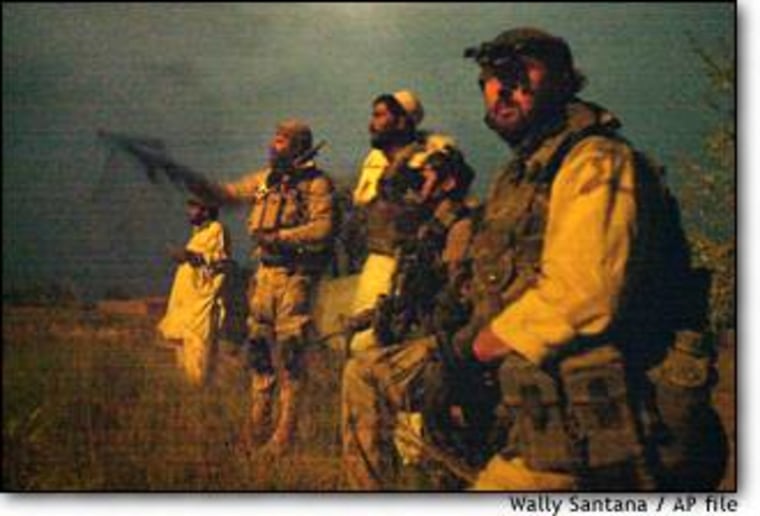John Wayne might have shuddered at the thought, but scientists have discovered that Mother Nature may contribute to the legendary toughness of the Green Berets. According to researchers, members of the elite special forces unit may be able to cope better with stress because of a hormone that helps them stay focused under fire. Scientists hope the same chemical will one day prevent the debilitating effects of combat on ordinary soldiers returning from the battlefield.
“We were very excited by these results,” Dr. Andy Morgan, a professor of psychiatry at Yale University School of Medicine and a researcher with the National Center for Post-Traumatic Stress Disorder, said in an August interview for the Department of Veterans Affairs.
Morgan and his colleagues examined the stress response of special forces soldiers who undergo a rigorous program as part of their training at the Military Survival School at Fort Bragg, N.C.
The training includes being held captive in a mock POW camp and undergoing simulated interrogation.
Measuring the trainees’ psychological and physical symptoms before and after the exercise, Morgan discovered that all participants produced high levels of the stress hormone cortisol. But the Army’s Green Berets produced higher levels of another hormone, known as neuropeptide Y, or NPY, than did Rangers or Marines.
NPY is a chemical messenger in the brain that helps control appetite and buffers the effects of stress.
“Those that produce less NPY performed poorly in the training and looked a lot more anxious and frazzled at the end,” Morgan said in the VA interview.
In short, the Green Berets experienced the same stress as their fellow soldiers but were better able to cope with it, possibly at least in part because of hormonal differences.
But, despite the intriguing results of the NPY study, scientists still do not know whether the differences found between the Green Berets and other groups of soldiers represent a genetic predisposition or whether there was “something in their previous training in the military that helped them perform better under stress,” Morgan said.
“It is a question of nature versus nurture,” adds Dr. Matthew Friedman, executive director of the Center for PTSD.
‘MORNING-AFTER PILL’ FOR SOLDIERS?
For the military, severe stress is nothing new. PTSD has been observed in many veterans, but in-depth research into the problem began only after the Vietnam War.
According to a major study, an estimated 30 percent of all Vietnam vets developed PTSD and 15 percent were still suffering from it as late as 1988. In general, researchers believe about a third of all men and women who have spent time in war zones experience PTSD.
Given the widespread nature of the problem, finding a way to mitigate the effects of traumatic experiences would be an enormous benefit to the military and society as a whole.
Morgan is convinced that NPY could eventually be used as a medication for soldiers suffering from PTSD — a kind of “morning-after pill” for troops returning from battle.
Meanwhile, Friedman hopes that one day scientists will be able to train people to naturally raise their own levels of NPY to ward off the effects of stress.
NO ‘MAGIC BULLET’
But some researchers remain skeptical.
“Theoretically, it is possible,” says Dr. Stevan Hobfoll, professor of psychology and director of the Center for Treatment and Studies of Traumatic Stress at Kent State University. But there is still little knowledge about the actual mechanism of such hormones like NPY, he says.
Hobfoll adds that medication will never be the only treatment for PTSD and at best will be one only part of the solution. Hobfoll, who was co-chairman of the American Psychological Association Commission on Stress and War during the 1991 Gulf War, believes that some within the military are pushing hard for a “magic bullet” approach to help traumatized soldiers.
But Hobfoll says that regardless of what drugs are developed, psychotherapy will likely continue to play a primary role in the recovery process.
There are several psychotherapies available to treat PTSD, with cognitive-behavioral therapy generally considered the most effective. In this approach, patients relive and discuss traumatic events under professional supervision.
“In many cases, this causes a certain amount of distress but it has been found to be among the most effective treatments,” Dr. Farris Tuma, chief of the Traumatic Stress Research Program at the National Institute of Mental Heath, said in an interview with the Akron (Ohio) Beacon Journal.
Still, researchers are continuing in their efforts to develop anti-stress agents.
“We think that it is an important step,” Friedman says.
Morgan’s goals go even further — he plans to focus on stress prevention and how to “treat healthy people before they become unhealthy,” he said in the VA interview.
If these researchers are successful, their discoveries may trick Mother Nature once again.
